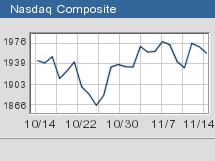NEW YORK (CNN/Money) -
Good news just doesn't seem to be enough for tech stocks these days.
The Nasdaq has been flirting with the 2000 mark since early October but has yet to crack it. Many big tech stocks are trading just below their 52-week highs but have failed to set new ones. And that's despite some very encouraging earnings reports from tech bellwethers during the past few weeks.
Cisco Systems reported strong results last week. What's more, Cisco CEO John Chambers, whose words are scrutinized nearly as closely as Alan Greenspan's, sounded more upbeat about the outlook for corporate tech spending than he has in nearly two years. But that didn't matter for most tech stocks.
 |
|
| Nasdaq 2000: Close, but no cigar. |
Sure, Cisco (CSCO: Research, Estimates) rose sharply the day after its earnings came out -- but the Nasdaq gained less than 1 percent. And shares of several Cisco networking rivals -- which presumably should benefit from a broad pickup in spending on equipment as well -- fell.
Then on Wednesday, the No. 1 chip equipment maker Applied Materials (AMAT: Research, Estimates) posted better than expected growth in sales, earnings and new orders. And AMAT CEO Michael Splinter was even more bullish than Chambers about the future. Yet, AMAT's stock fell nearly 3 percent Thursday, and the Nasdaq dipped as well.
Finally, Dell reported solid gains in earnings and sales Thursday and raised its sales guidance for the fourth quarter. Dell wasn't as gung-ho as Cisco or AMAT but then again, Dell is extremely conservative, so the lack of cheerleading shouldn't have been a shock to tech investors.
Shares of Dell (DELL: Research, Estimates) barely budged Friday and the Nasdaq once again was heading south. What gives?
Well, tech stocks have already chalked up huge gains this year. The Nasdaq composite index is up 47 percent. Cisco has soared 73 percent and AMAT is up nearly 90 percent. A realization that techs have perhaps come too far, too fast is starting to set in.
| Related stories
|

|
|
|
|
Even though third-quarter earnings reports were nearly universally solid, it appears that investors had already factored them into stock prices. For that matter, increased guidance for the fourth quarter also seems to be baked in. So barring positive news about 2004 earnings in the coming weeks, techs could trade sideways for the rest of the year.
"This has been a phenomenal year for tech stocks and a lot of people want to lock these gains in and ride this out," said Ozan Akcin, chief market strategist with Puglisi & Co. Akcin said that the next near-term positive catalyst he sees for techs would be if they give upbeat outlooks about 2004 during their fourth-quarter earnings reports in January.
Valuations could be a bit of a concern as well since there are still some questions about how strong 2004 will be for the tech sector.
Michael Cohen, director of research for Pacific American Securities, said that even though it appears that corporate spending on technology is finally improving and that this is good news for the tech sector in general, some stocks still look a bit pricey.
Intel (INTC: Research, Estimates), which trades at nearly 30 times 2004 earnings estimates, is a prime example of a company whose earnings multiple is a bit stretched, Cohen said. Its shares have more than doubled this year.
"I'm surprised Intel has been able to run up as much as it has. News of a semiconductor recovery was factored in at a lower price," Cohen said. He added that valuations for Network Appliance (NTAP: Research, Estimates), Veritas Software (VRTS: Research, Estimates) and Intel competitor Advanced Micro Devices (AMD: Research, Estimates) are also starting to get frothy.
Still, it's hard to find any major negatives about fundamentals from the third quarter reports of major tech companies. The tech sector clearly is in much better shape than it was earlier in the year. But investors have already figured that out. Nasdaq 2000 may be inevitable. It just may take some time to get there.
"The market feels a little tired. It's been up late at night and it needs to take a little rest," said Todd Campbell, president of E.B. Capital Markets, an independent research firm catering to institutional investors.

|

